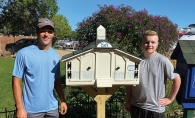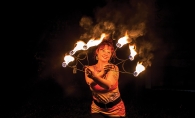Long before he started competing in spelling bees, Carey Meyer knew her son Max had an affinity for language. “In second grade he kept a notebook with interesting words he’d write down, especially foreign words and their origins,” says Carey Meyer. “At the time, I didn’t think much of it.”
As a fifth-grader at Excelsior Elementary, Max won a classroom spelling bee and then the school bee without any preparation. “That’s when I realized I like spelling a lot, and it’s one of my talents,” he says.
In March, while an eighth-grader at Minnetonka Middle School East, Max won the Twin Cities metro area regional spelling bee, qualifying him to compete at the 89th annual Scripps National Spelling Bee, held May 22–26 in National Harbor, Maryland, just outside of Washington, D.C.
The nation’s largest and longest-running spelling contest, the bee began in 1925 to help students improve their vocabulary and spelling skills. Open to students under age 16 who haven’t passed beyond the eighth grade, the bee has grown in prestige and size over the decades, with the national finals broadcast live on ESPN.
This year, 285 contestants from across the country competed in the bee, with the top 45 spellers moving on to the finals. Max was among them, ultimately finishing in 11th place after misspelling his fourth word of the day, “dulia,” the reverence accorded to saints and angels.
“The second round was the most difficult because I knew he would be devastated if eliminated at that level,” says Carey Meyer. “As each round went on, I freaked out less. It was all icing on the cake after that.”
“It was a good experience all around,” says Max, who tied for 11th place at the 2015 national bee. “I was thankful to be back there again and I wanted to do as well as I did last year.”
Max didn’t rely solely on his natural talent to get him to Scripps. His study regimen combined rote memorization and learning language patterns, with his mom quizzing him on words and their definitions.
Max taught his mom how to read diacritics, the symbols that indicate how a word is pronounced that often accompany its definition in the dictionary, so she could replicate how words would be pronounced at the bee.
“He’s a very self-motivated kid,” says Carey. “I wanted to help him realize his goals in whatever ways I could.” Unlike many parents, she didn’t have to plead with her son to study. “If anything, I had to encourage him to take a break from words,” she says.
According to Max, learning language patterns and root words is key to becoming a great speller. “It’s not useful learning individual words if you can figure it out from patterns,” he says, citing as an example being confronted with the unfamiliar word “hematorrhachis” on the bee’s preliminary test. “I recognized ‘hemato’ as ‘blood’ and ‘rhachis’ meaning ‘spine,’ and that’s how I figured it out,” he says.
Though the national spelling bee uses only English words, many of them have their origins in languages like Latin, Greek, French and Spanish. Max says his favorites are Portuguese, because of its unique spelling patterns, and Welsh, because of how unusual many of its spellings are. Max notes that knowing more words “helps you better understand the world around you. You know more about different cultures, different fields and how terms relate to each other.”
Now a freshman at Minnetonka High School, Max will focus on other extracurricular activities this year, since there are no real spelling bees for high-schoolers. However, his competitive spelling days are not completely behind him. “I hear there’s a senior spelling bee for people 50 and older,” he jokes.
“Max is really academically minded and well-rounded,” says Carey. “This has been a lot of fun, but I’m excited for whatever he ends up doing; there are more great things to come.”
Find out more about the Scripps National Spelling Bee and the 2016 participants, or see if you could have qualified for the finals by taking the actual preliminaries test at the website here.









